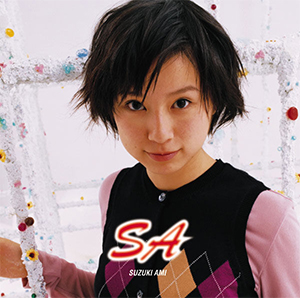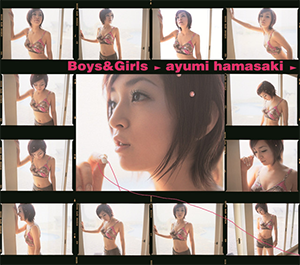
Tetsuya Komuro is a Japanese musician, songwriter and record producer. He is recognized as the most successful producer in Japanese music history and introduced contemporary electronic dance music to the Japanese mainstream. He was also a former owner of the disco Velfarre located in Roppongi, Tokyo.

Loveppears is the second studio album by Japanese recording artist Ayumi Hamasaki. It was released in Japan, Hong Kong and China on November 10, 1999 through Avex Trax and the China Record Corporation, and distributed worldwide on April 10, 2001 by Avex Entertainment Inc. It was entirely written by Hamasaki herself, while the production was handled by Japanese musician Max Matsuura. Musically, Loveppears is a dance album and lyrically focuses on themes of love, frustration of life, loneliness, and individualism.

Ami Suzuki is a Japanese recording artist, DJ, and actress from Zama, Kanagawa, Japan. Having been discovered at the talent TV show Asayan, she was one of the most popular female teen idols in the late 1990s. However, in 2000, Suzuki faced legal problems with her management company resulting in a controversial blacklisting from the entertainment industry. Suzuki attempted to resurrect her career under her own steam with two indie singles before signing to Avex Trax in 2005. She released "Delightful", a dance song that reached No. 3 on the Japanese Oricon charts with a style similar to electronic club music, significantly different from her pop idol days. Since her appearance in the 2006 film Rainbow Song, Suzuki has gradually made a name for herself in the acting field, starring in various movies, television series, and musicals.

Sweet 19 Blues is the second studio album by Japanese recording artist Namie Amuro. The album was released in four different slipcases, with the first three cases limited to 1,000,000 copies each—were put on sale on July 20, 1996, throughout Japan, and were distributed two days later to the rest of Asia by Avex Trax. The album was primarily handled by Japanese producer Tetsuya Komuro, with the assistance of Cozy Kubo, Akio Togashi, Takahiro Maeda, M.C.A.T. and Randy Waldman, it is her debut solo album to date since the spilt of Super Monkey's.

SA is Ami Suzuki's debut album released under label Sony Music Japan on 25 March 1999.

"To Be" is a song by Japanese recording artist Ayumi Hamasaki. It served as the third single from Hamasaki's second studio album Loveppears (1999). The track was released by Avex Trax in Japan and Taiwan on May 12, 1999, and through Avex Entertainment Inc. worldwide in September 2008. It was Hamasaki's final single to be distributed as a Mini-CD, a format that debuted at the start of her career in April 1998. "To Be" was written by Hamasaki herself, while production was handled by long-time collaborator Max Matsuura. Musically, it is a J-Pop that was written in third person perspective, much like the content from the parent album.

"Boys & Girls" is a song recorded by Japanese recording artist Ayumi Hamasaki, serving as the fourth single for her second studio album, Loveppears (1999). It was released by Avex Trax in Japan and Hong Kong on July 14, 1999, and through Avex USA in North America in early 2001, while being re-distributed in 2003. "Boys & Girls" marks Hamasaki's first single to be made available for purchase as a maxi single with additional remixes. The track was written by the singer herself, while production was handled by long-time collaborator Max Matsuura. Musically, the song is a dance recording, a genre that heavily influences Loveppears. The single's lyrical content is written in third-person perspective.

A is an extended play (EP) by Japanese recording artist Ayumi Hamasaki. It was released by Avex Trax in Japan and Hong Kong on August 11, 1999, in 10 different editions, and through Avex Entertainment Inc. worldwide in September 2008. It additionally served as a single from her second studio album Loveppears (1999), and is her first single marketed as an EP. The 12-track EP contains four new original songs: "Monochrome", "Too Late", "Trauma", and "End Roll", and eight remixes. All songs were written by Hamasaki, while production was handled by long-time collaborator Max Matsuura.

"Kanariya" is a song recorded by Japanese recording artist Ayumi Hamasaki for her second studio album, Loveppears (1999). It was released by Avex Trax in Japan and Hong Kong on December 8, 1999, and through Avex USA in North America in early 2000. The recording also served as Hamasaki's second limited edition single, with limited physical units of 300,000 copies. The track was written by Hamasaki herself, while production was handled by long-time collaborator Max Matsuura. Two versions of "Kanariya" were made available for consumption—a radio edit produced by American disc jockey Jonathan Peters, and the album version composed by Yasuhiko Hoshino. Lyrically, the song was written in third person perspective.

"Fly High" is a song recorded by Japanese recording artist Ayumi Hamasaki. It was released by Avex Trax in Japan on February 9, 2000, and through Avex Entertainment Inc. worldwide in September 2008. The recording served as Hamasaki's third and final limited edition single from her second studio album, Loveppears (1999), limiting physical units to 300,000 copies. The track was written by the singer herself, while production was handled by long-time collaborator Max Matsuura. Two versions of "Fly High" were made available for consumption—a radio edit composed by HΛL, and the album version produced by Dai Nagao. Lyrically, the song was written in third person perspective.
"Love the Island" is the debut single of Japanese singer Ami Suzuki released on July 1, 1998 through True Kiss Disc, sub-label of Sony Music Entertainment Japan owned by Tetsuya Komuro.

"Alone in My Room" is a song by Ami Suzuki, released as her second single in September 1998.
"Be Together" is a song from Japanese band TM Network, written by Mitsuko Komuro and composed by Tetsuya Komuro, it was included in their fifth album Humansystem. Despite the fact that it wasn't released as a single and was not popular at its initial release, the 1999 cover made by Ami Suzuki the song became very popular in Japan, and it has since been covered by several artists.

"Free Free" is a song by Japanese recording artist Ami Suzuki and producer Yasutaka Nakata, taken from her sixth studio album Dolce (2008). It was released on August 22, 2007 through Avex Trax and was distributed into three physical formats and for digital consumption. Additionally, the track appeared as a double A-side to "Super Music Maker", another recording by Suzuki and Nakata. Suzuki first started working with the producer in late 2006 after her staff at Avex noticed the singers engagement with dance-oriented music whilst performing at night clubs, and wanted to pair her with a musician that dealt with electronic dance music.

"One" is a song recorded by Japanese recording artist Ami Suzuki for her seventh studio album, Supreme Show (2008). It was written and produced by Japanese producer and Capsule member Yasutaka Nakata. The track is Suzuki's third single with Nakata after her August 2007 single's "Free Free" and "Super Music Maker". "One" premiered on June 18, 2008, as the lead single from the album.

"Can't Stop the Disco" is a song recorded by Japanese recording artist Ami Suzuki for her seventh studio album, Supreme Show (2008). It was written and produced by Japanese producer and Capsule member Yasutaka Nakata. The track is Suzuki's third single with Nakata after her June 2008 single "One". "Can't Stop the Disco" premiered on September 24, 2008 as the second single from the album.

Supreme Show is the seventh studio album by Japanese recording artist Ami Suzuki. It was released on November 12, 2008 by Avex Trax as her 10th Anniversary album. It was also released ten months after her joint project album, Dolce. Supreme Show is Suzuki's first album to be fully produced, composed, and arranged by Japanese musician and Capsule member Yasutaka Nakata. Suzuki contributed to the album as the lead vocalist, background vocalist, and co-songwriter for the track "Love Mail". With tracks recorded in both English and Japanese language, Supreme Show is an electronic dance music album.

"Reincarnation" is a song by Japanese recording artist Ami Suzuki for her second greatest hits album, Ami Selection (2011). It was written by Emi Hinouchi and produced by Taku Takahashi. It was Suzuki's first collaboration with both Hinouchi and Takahashi. It premiered on February 25, 2009, as the lead single from the album. The CD and digital cover sleeve has a close-up of Suzuki hovering a GCI bubble. The DVD cover sleeve features a slightly altered version of it.

"Feel the Love" is a song recorded by Japanese recording artist Ayumi Hamasaki. It was released in six different formats on December 25, 2013 by Avex Trax, Avex Taiwan, and Avex Entertainment Inc. worldwide. It was also her first physical release in three years since her EP–single L (2010), and her first double A-side single, alongside the track "Merry-Go-Round", since "Moon" and "Blossom" that same year. The track was written by the singer, whilst production was handled by Japanese musician and long-time collaborator Max Matsuura with the assistance of DJ Hello Kitty; this marks the singer's first single to be produced with another producer outside of Matsuura. Musically, "Feel the Love" is an electronic dance song that lyrically focuses on love and having a good time.

"Super Music Maker" is a song recorded by Japanese recording artist and songwriter Ami Suzuki, for her sixth studio album Dolce (2008) and a re-recorded version for her seventh album Supreme Show (2008). Featuring Japanese record producer and Capsule member Yasutaka Nakata, the song was released as the lead single and double a-side single with "Free Free" from Dolce on August 22, 2007 through Avex Trax. Nakata had written, produced and arranged both tracks and is her first single to be handled by Nakata following later singles from her album Supreme Show (2008). Backed by synthesizers and keyboards, "Free Free" incorporates a new genre called "Eropop" with influences of electronic dance, house and disco music. The lyrical interpretation was based on the theme of erotica and freedom.















